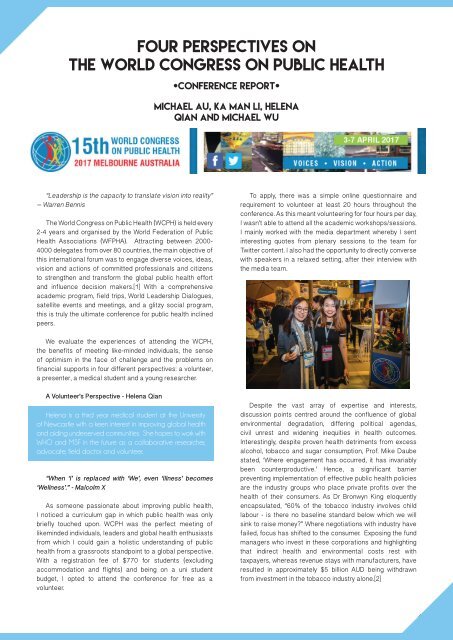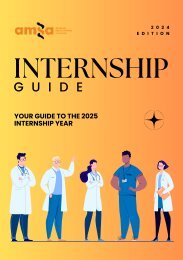Vector Volume 11 Issue 2 - 2017
You also want an ePaper? Increase the reach of your titles
YUMPU automatically turns print PDFs into web optimized ePapers that Google loves.
Four perspectives on<br />
the World Congress on public health<br />
[Conference report]<br />
Michael Au, Ka Man Li, Helena<br />
Qian and Michael Wu<br />
“Leadership is the capacity to translate vision into reality”<br />
– Warren Bennis<br />
The World Congress on Public Health (WCPH) is held every<br />
2-4 years and organised by the World Federation of Public<br />
Health Associations (WFPHA). Attracting between 2000-<br />
4000 delegates from over 80 countries, the main objective of<br />
this international forum was to engage diverse voices, ideas,<br />
vision and actions of committed professionals and citizens<br />
to strengthen and transform the global public health effort<br />
and influence decision makers.[1] With a comprehensive<br />
academic program, field trips, World Leadership Dialogues,<br />
satellite events and meetings, and a glitzy social program,<br />
this is truly the ultimate conference for public health inclined<br />
peers.<br />
To apply, there was a simple online questionnaire and<br />
requirement to volunteer at least 20 hours throughout the<br />
conference. As this meant volunteering for four hours per day,<br />
I wasn’t able to attend all the academic workshops/sessions.<br />
I mainly worked with the media department whereby I sent<br />
interesting quotes from plenary sessions to the team for<br />
Twitter content. I also had the opportunity to directly converse<br />
with speakers in a relaxed setting, after their interview with<br />
the media team.<br />
We evaluate the experiences of attending the WCPH,<br />
the benefits of meeting like-minded individuals, the sense<br />
of optimism in the face of challenge and the problems on<br />
financial supports in four different perspectives: a volunteer,<br />
a presenter, a medical student and a young researcher.<br />
A Volunteer’s Perspective - Helena Qian<br />
Helena is a third year medical student at the University<br />
of Newcastle with a keen interest in improving global health<br />
and aiding underserved communities. She hopes to work with<br />
WHO and MSF in the future as a collaborative researcher,<br />
advocate, field doctor and volunteer.<br />
“When ‘I’ is replaced with ‘We’, even ‘Illness’ becomes<br />
‘Wellness’.” - Malcolm X<br />
As someone passionate about improving public health,<br />
I noticed a curriculum gap in which public health was only<br />
briefly touched upon. WCPH was the perfect meeting of<br />
likeminded individuals, leaders and global health enthusiasts<br />
from which I could gain a holistic understanding of public<br />
health from a grassroots standpoint to a global perspective.<br />
With a registration fee of $770 for students (excluding<br />
accommodation and flights) and being on a uni student<br />
budget, I opted to attend the conference for free as a<br />
volunteer.<br />
Despite the vast array of expertise and interests,<br />
discussion points centred around the confluence of global<br />
environmental degradation, differing political agendas,<br />
civil unrest and widening inequities in health outcomes.<br />
Interestingly, despite proven health detriments from excess<br />
alcohol, tobacco and sugar consumption, Prof. Mike Daube<br />
stated, ‘Where engagement has occurred, it has invariably<br />
been counterproductive.’ Hence, a significant barrier<br />
preventing implementation of effective public health policies<br />
are the industry groups who place private profits over the<br />
health of their consumers. As Dr Bronwyn King eloquently<br />
encapsulated, “60% of the tobacco industry involves child<br />
labour - is there no baseline standard below which we will<br />
sink to raise money?” Where negotiations with industry have<br />
failed, focus has shifted to the consumer. Exposing the fund<br />
managers who invest in these corporations and highlighting<br />
that indirect health and environmental costs rest with<br />
taxpayers, whereas revenue stays with manufacturers, have<br />
resulted in approximately $5 billion AUD being withdrawn<br />
from investment in the tobacco industry alone.[2]<br />
47

















